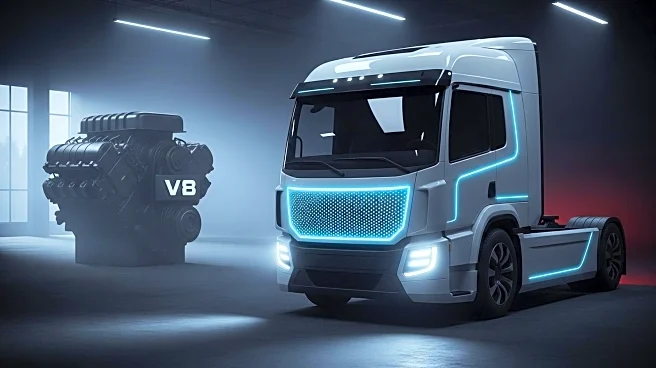What's Happening?
Ram's RHO truck, initially introduced as a more efficient alternative to the V-8 powered TRX, is now facing an uncertain future. The RHO, powered by a Hurricane inline-six engine, was developed to meet regulatory demands and modernize the Ram brand. However, recent changes in fuel economy and emissions standards have diminished the necessity for such a model. As a result, Ram is considering bringing back the supercharged V-8 TRX, which could lead to the RHO being discontinued or repositioned as a lower-tier model. This shift reflects a broader industry trend of returning to more powerful engines as regulatory pressures ease.
Why It's Important?
The potential discontinuation of the RHO truck highlights a significant shift in the automotive industry, where regulatory changes are influencing product strategies. The return to V-8 engines could impact Ram's market positioning and consumer preferences, as the brand aligns with a demand for more powerful vehicles. This move may benefit Ram by attracting enthusiasts who favor performance over efficiency. However, it also raises questions about the long-term sustainability of such strategies in an era increasingly focused on environmental concerns. The decision could set a precedent for other manufacturers considering similar shifts.
What's Next?
If Ram proceeds with reintroducing the V-8 TRX, it may lead to a reevaluation of its product lineup and marketing strategies. The company will need to assess consumer response and market trends to determine the viability of maintaining both the RHO and TRX models. Additionally, Ram's decision could prompt reactions from competitors, potentially influencing broader industry trends. Stakeholders, including environmental groups and regulatory bodies, may also weigh in on the implications of reverting to less efficient engines.
Beyond the Headlines
The potential shift back to V-8 engines raises ethical and environmental considerations, as it contrasts with global efforts to reduce emissions and promote sustainability. This development could spark debates about the automotive industry's responsibility in addressing climate change and the balance between consumer demand and environmental impact.










